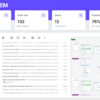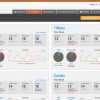In the realm of business strategy, Artificial Intelligence (AI) is no longer just a luxury; it’s a crucial player in the game. AI transforms raw data into actionable insights that can profoundly impact your business decisions. This guide explores how integrating AI into your strategy not only sharpens decision-making but also propels your company towards unprecedented growth and efficiency.
1. Unraveling the Power of AI-Driven Analytics
First Things First: Understand Your Data
Before diving into AI, it’s essential to grasp what data you have and what it represents. AI tools are only as good as the data fed into them. Companies like Tableau (tableau.com) and Microsoft Power BI (powerbi.microsoft.com) offer solutions that can help you visualize and understand your data landscapes, making them ripe for AI integration.
The Magic Wand: Predictive Analytics
Once you understand your data, predictive analytics can forecast future trends based on historical data. Tools such as SAS Predictive Analytics (sas.com) and IBM Watson (ibm.com/watson) can help you peer into the future, determining patterns and outcomes that were previously hidden in the vast sea of data.
2. Streamlining Operations with AI Automation
Goodbye, Mundane Tasks!
AI thrives in taking over repetitive, time-consuming tasks. By automating processes like customer data entry or payroll, AI systems free up your staff’s time for more critical tasks, enhancing productivity. Automation tools like UiPath (uipath.com) and Automation Anywhere (automationanywhere.com) provide platforms that can automate virtually any routine task.
Enhance Your Supply Chain
AI can transform your supply chain management by optimizing logistics and forecasting demand more accurately. AI-driven tools from companies like Blue Yonder (blueyonder.com) utilize real-time data to predict market changes and adjust supply strategies accordingly, ensuring efficiency and reducing waste.
3. Personalizing Customer Interactions
Know Your Customer Better Than Ever
AI excels in understanding and predicting customer behavior. By analyzing data from various touchpoints, AI can provide a 360-degree view of customer preferences and behaviors. Platforms like Salesforce Einstein (salesforce.com/einstein) harness AI to tailor customer interactions, making them more personal and increasing engagement.
Real-Time Engagement
Chatbots and virtual assistants powered by AI can interact with customers in real-time, providing instant responses and support. This not only improves customer satisfaction but also enhances the efficiency of your customer service department. Tools like Intercom (intercom.com) and Drift (drift.com) can automate these interactions, ensuring customers feel valued and supported 24/7.
4. Innovating Product Development with AI
Speed Up Product Innovation
AI can significantly reduce the time it takes to bring new products to market. By using AI to analyze market data and consumer feedback, companies can quickly adapt their products to meet the ever-changing demands of the market. Adobe’s Sensei (adobe.com/sensei) uses AI to drive product design and innovation, helping businesses stay ahead in competitive markets.
Test and Learn
AI enables businesses to simulate and test various scenarios in product development without the high costs associated with physical trials. Simulations and predictive models can forecast how new products will perform, allowing for adjustments before actual development begins. This not only saves time but also reduces the risk of costly failures.
5. Enhancing Decision-Making with AI Insights
Make Smarter Decisions, Faster
AI-powered decision-making tools integrate vast amounts of data and provide insights that are not apparent to human analysts. This allows for quicker, more informed decision-making. Google Cloud’s AI and machine learning products (cloud.google.com/products/ai) provide tools that help refine decision-making processes, enabling businesses to act swiftly and confidently.
Risk Management
AI can also help manage risks by identifying potential problems before they become actual issues. Predictive analytics can alert you to risks in financial markets, supply chains, or cybersecurity threats, allowing you to take preemptive action. This proactive approach can save considerable resources and protect your business from unexpected disruptions.
In Summary
AI isn’t just another tool in the toolbox—it’s a revolutionary approach that can enhance every aspect of your business. From sharpening analytics to automating operations, personalizing customer interactions, innovating products, and making smarter decisions, AI has the potential to transform how you do business. The question is no longer if AI will be integral to business strategies, but how quickly you can integrate it to stay competitive and efficient in a data-driven world.
Contact Us for more info!

















